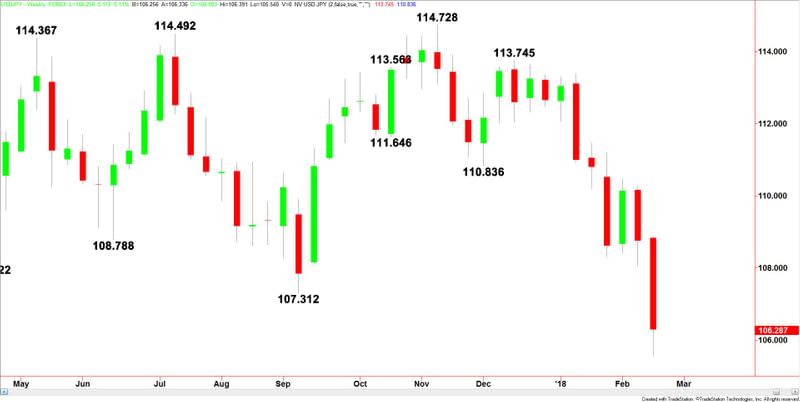Dollar Hits Three-Year Low Against Japanese Yen
The U.S. Dollar closed near a three-year low against a basket of major currencies last week while posting its biggest weekly loss in nine months. Several factors drove contributed to the move including negative sentiment which offset any support the Greenback received from higher Treasury yields.
March U.S. Dollar Index futures settled at 89.013, down 1.321 or -1.46%.

Some investors blamed the worst weekly drop in the currency since February 2016 on the breakdown in correlation between the U.S. Dollar and Treasury yields. The dollar’s weakness came as U.S. Treasury yields hit four-year highs and as stronger-than-expected U.S. inflation bolstered bets that the Federal Reserve could increase interest rates as much as four times this year.
The counter-intuitive price action left investors and analysts bewildered, as higher Treasury yields are normally associated with a stronger dollar.
Other investors said Treasury yields are being driven higher not by expectations for stronger growth, but by fears about fiscal instability and inflation spiraling out of control. This may be the reason an inverse correlation has emerged between the dollar and long-term Treasury yields.
In other news, U.S. consumer prices rose considerably more than expected in January, fueling fears that inflation is about to turn dangerously higher.
The Consumer Price Index rose 0.5 percent last month against projections of a 0.3 percent increase, the Labor Department reported last Wednesday. Excluding volatile food and energy prices, the index was up 0.3 percent against estimates of 0.2 percent.
The report indicated that price pressures were “broad-based,” with rises in gasoline, shelter, clothing, medical care and food.

Australian Dollar
The Australian Dollar rose against the U.S. Dollar as investors shed the Greenback due to inflation fears. A recovery in the global equity markets also fueled the rally as it increased demand for commodities and other higher risk assets.
The AUD/USD settled the week at .7907, up 0.0099 or +1.26%.
The Australian employment report came in slightly better than expected. It also showed that Australia has now created jobs in each of the past 16 months, the longest stretch in history.
According to the Australian Bureau of Statistics (ABS), employment grew by 16,000 in seasonally adjusted terms in January, marginally topping forecasts for an increase of 15,300.
Australia’s unemployment rate fell to 5.5%. That was in line with market expectations, and below the upwardly-revised 5.6% level of December.

Japanese Yen
The dollar hit a 3-year low against the Japanese Yen last week despite surging U.S. Treasury yields and a rebound in global equity markets. The move may have been fueled by inflation concerns in the U.S. as well as worries about the huge U.S. current and budget deficits.
The USD/JPY settled at 106.287, down 2.470 or -2.27%.
The move prompted Chief Cabinet Secretary Yoshihide Suga to say the Japanese government would watch moves in the market and noted that foreign exchange stability was key.
In other news, the reappointment of Haruhiko Kuroda as Bank of Japan governor and the nomination of BOJ executive director Masayoshi Amamiya and Waseda University professor Masazumi Wakatabe as deputy governors were seen certain to keep the central bank on an ultra-loose policy path. The news, however, had little impact on the price action.
This article was originally posted on FX Empire
More From FXEMPIRE:
Crude Oil Price Update – Bullish Over $62.15, Bearish Under $61.18
Natural Gas Price forecast for the week of February 19, 2018, Technical Analysis
FTSE 100 Price forecast for the week of February 19, 2018, Technical Analysis
Silver Price forecast for the week of February 19, 2018, Technical Analysis

 Yahoo Finance
Yahoo Finance 